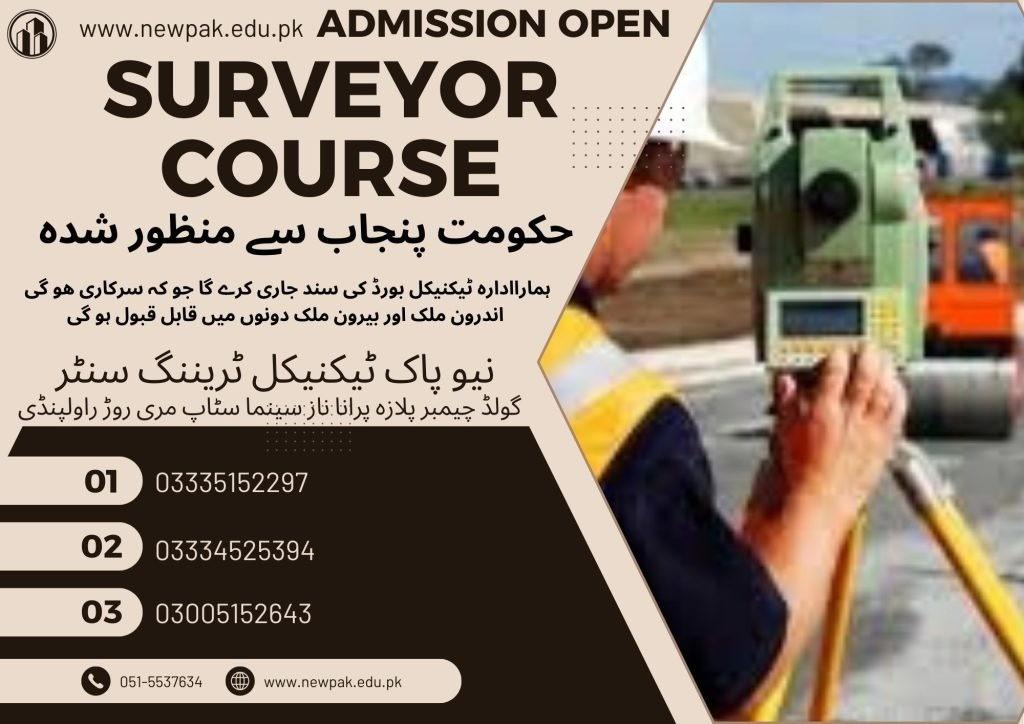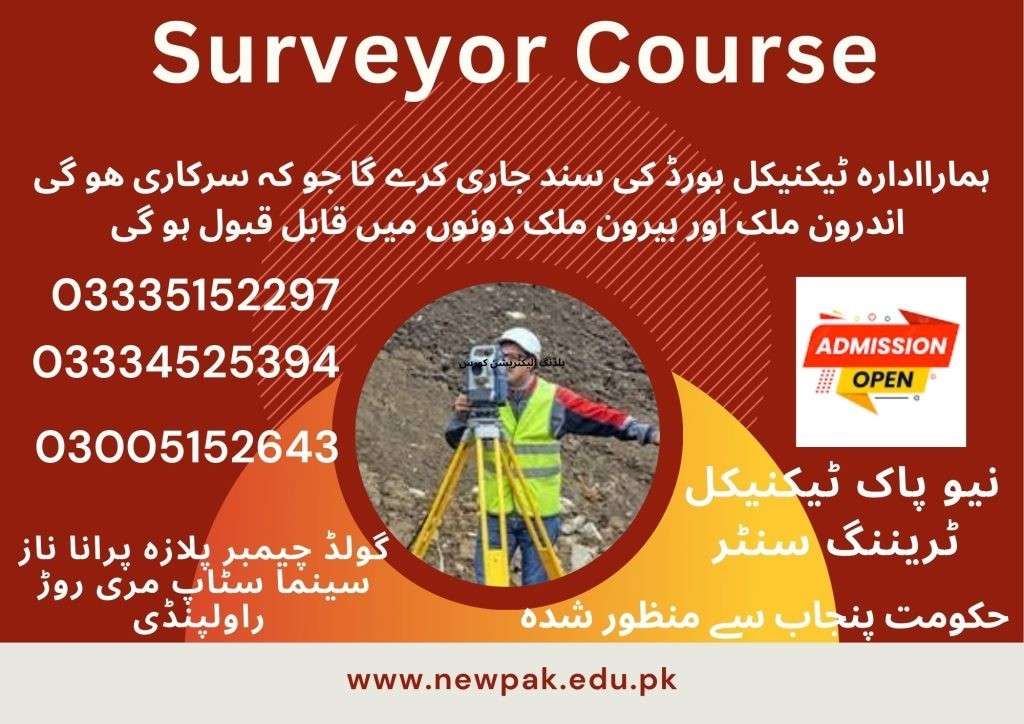Surveyor Course in Rawalpindi Islamabad
The Surveyor Certificate and Diploma Program is designed to deliver a strong foundation in surveying through both classroom instruction and hands-on fieldwork. Ideal for those pursuing a surveyor certificate course or looking to begin a surveying degree path, this program covers everything from traditional tools to modern surveying technologies. Emphasis is placed on ethical practices, accurate measurements, and professional standards essential for infrastructure and land development.
Course Overview
The 6-month surveyor course introduces core concepts including instrument handling, field measurements, AutoCAD drafting, and practical exercises, perfect for those seeking land surveyor training or entry-level surveying classes. The 1-year diploma expands into advanced methods like triangulation, photogrammetry, construction layout, and surveying regulations in Pakistan. Together, the programs prepare students for a career in surveying and mapping, with skills applicable to both private sector and government roles.

Course Duration
06 | Months
- History & Branches of Surveying
- Survey Ethics & Professional Conduct
- Surveying Instruments (Chains, Levels, Theodolites, GPS)
- Chain Surveying & Leveling
- Traversing & Topographical Surveying
- Construction Setting Out (Basic)
- Fieldwork & Data Collection
- Surveying Software (Introductory)
- Manual Drafting & AutoCAD (Basic)
01 | Year
- History & Branches of Surveying
- Survey Ethics & Professional Conduct
- Surveying Instruments (Chains, Levels, Theodolites, GPS)
- Chain Surveying & Leveling
- Traversing & Topographical Surveying
- Construction Setting Out (Basic)
- Fieldwork & Data Collection
- Surveying Software (Introductory)
- Manual Drafting & AutoCAD (Basic)
- Triangulation Techniques
- Photogrammetry & Remote Sensing Basics
- Computer-Aided Surveying (CAS Tools & Mapping)
- Construction Surveying (Advanced Layouts)
- Land Laws & Surveying Regulations
- Project Management & Industry Readiness
Course Outline (6 Months)
Introduction to Surveying
Month 1
- History of surveying and its significance in infrastructure development
- Different branches of surveying (e.g., land, construction, topographical)
- Surveying course ethics and professional conduct
Surveying Instruments
Month 2
- Linear measuring instruments: chains, tapes, arrows
- Leveling instruments: dumpy level, automatic level
- Basics of angular measuring instruments: theodolites and compasses
- Introduction to Total Stations and GPS (Global Positioning System)
Surveying Techniques – Part I
Month 3
- Chain surveying: distance measurement and plotting methods
- Leveling: principles, differential and profile leveling, reduction of levels
Surveying Techniques – Part II
Month 4
- Traversing: open and closed traverse, calculations, balancing errors
- Topographical surveying: data collection (tacheometry, contouring)
- Basic setting out techniques for construction
Fieldwork and Data Collection
Month 5
- Practical exercises using surveying instruments
- Field data collection techniques and maintaining field books
- Introduction to data processing using basic surveying software
Technical Drafting and AutoCAD
Month 6
- Surveying symbols and conventions used in maps and plans
- Manual drafting techniques for survey plans
- Introduction to AutoCAD for computer-aided drafting
Course Outline (1-Year)
Months 1–6: Core Surveyor Course in Rawalpindi Islamabad
(Same course content as the 6-month program but with more detail, role-plays, software demos, and assessments.)
Expert Surveying Techniques Part-I
Month 7
- Triangulation theory and purpose
- Methods of establishing control points
- Triangulation network layout and calculations
- Practical exercises in triangulation surveying
Surveying Techniques Part-II
Month 8
- Introduction to photogrammetry
- Basics of aerial photography and image interpretation
- Applications of photogrammetry in mapping
- Fundamentals of remote sensing in land management
Computer-Aided Surveying (CAS)
Month 9
- Introduction to CAS software tools
- Data collection and input into CAS systems
- Processing field data for maps and visualizations
- Generating digital maps and basic analysis reports
Construction Surveying
Month 10
- Setting out foundations, columns, beams, and slabs
- Road surveying: centerline, cross-section, and profile layout
- Pipeline and canal alignment and level marking
- As-built survey techniques and documentation
Surveying Laws
Month 11
- Overview of Pakistan’s land laws (Land Revenue Act, etc.)
- Legal procedures for boundary demarcation
- Understanding plan approval processes
- Coordination with regulatory and local authorities
Project Management
Month 12
- Project planning and task scheduling for surveying jobs
- Resource and equipment management
- Cost estimation and budgeting in surveying projects
- Reporting standards and documentation practices

Career Opportunities
- Land Surveyor
- Construction Surveyor
- GIS and Mapping Technician
- Photogrammetry Technician
- Survey CAD Operator
- Assistant Survey Engineer
Conclusion
The Surveyor Course in Rawalpindi Islamabad provides comprehensive, hands-on training for students pursuing careers in surveying and mapping. Whether through the 6-month surveyor certificate course or the advanced 1-year diploma, learners gain expertise in land measurement, AutoCAD drafting, and field data collection. This program is ideal for those seeking professional surveyor training, land surveyor training, or stepping into a surveying degree or a surveying and mapping degree path. Graduates are equipped for roles in construction, GIS, mapping, and legal land demarcation, making this a valuable starting point for aspiring survey professionals.






